Just looking for our Best Pool Builder Website examples list?
Key Takeaways:
- Design with Purpose, Not Just Aesthetics
A high-performing pool builder website isn’t just about looking great—it needs to guide potential customers through a clear journey that leads to action, whether that’s viewing your gallery or requesting a quote. - Content, Structure, and Visuals Must Serve the User
Effective site design combines clean navigation, conversion-focused content, and striking visuals to create a seamless user experience that builds trust and reinforces your brand’s professionalism. - Ongoing Maintenance Is Essential, Not Optional
To maintain security, performance, and SEO value, your WordPress site must be updated and monitored regularly—just like the pools you build, your website requires expert care to function at its best.
Why Your Pool Builder Website Design Could Be Costing You Leads
When a homeowner starts dreaming about a new backyard oasis, their first stop isn’t at the hardware store—it’s online. That moment is your make-or-break opportunity. Your website isn’t just a digital brochure. It’s your top sales rep, your brand’s first impression, and your best shot at turning casual browsers into serious inquiries.
Yet too many pool builders rely on outdated, hard-to-navigate sites that repel potential customers rather than convert them. In this competitive market, having a professionally built, fast, and responsive website isn’t a luxury—it’s essential. The right design does more than look nice—it increases conversion rates, supports local SEO, and builds trust in your brand’s expertise.
This guide walks you through everything you need to know to build or rebuild a high-performing pool builder website. We’ll cover overlooked features that elevate user experience, increase trust, and turn your online presence into your strongest marketing tool. Whether you’re launching your first site or upgrading an existing one, this blog will help you get it right from the ground up.
The Foundation of Website Planning: Purpose-Driven Design from Day One
Before writing a single line of code or choosing your color palette, effective site design begins with a clear understanding of the site’s purpose. Unlike retail or media sites, a pool builder’s website doesn’t just need to attract visitors—it needs to convert them into qualified leads. That requires a detailed strategy rooted in who your ideal customer is, how they search, and what will make them trust you enough to request a quote or consultation.
The first step in planning is defining your core business goals. Are you trying to increase inquiries in a specific geographic region? Showcase luxury custom pool projects? Drive interest in a new financing option? These goals shape every design decision, from page structure to call-to-action placement. Without them, even the most visually appealing site can fall flat.
Another critical element is understanding your buyer’s journey. Homeowners shopping for a pool often go through weeks or months of research before making contact. Your website needs to support that process. That means clear service explanations, inspirational galleries, educational resources, and compelling proof of expertise—like testimonials, credentials, and case studies.
Companies also benefit from strong local SEO and conversion-focused features, including easy-to-navigate service pages, mobile-friendly design, and quick-contact forms that reduce friction. Your site must instill confidence and answer your customer’s top question: “Can I trust this company with a major home investment?”
A well-planned website becomes more than just a digital footprint—it becomes your best salesperson, active 24/7. If you’re also in the home construction market, you may find additional insights in our related home builder website design guide.
Key Design Principles for an Effective Site
Great site design is about guiding visitors toward a clear goal while reflecting your brand’s identity. For pool builders, the site must instantly communicate professionalism, attention to detail, and trustworthiness. Every visual and functional element must work together to create a seamless user experience that drives conversion.
One of the most important design principles is visual hierarchy. Your most critical content—such as service offerings, project galleries, and calls to action—should be placed prominently, using contrast, size, and placement to draw attention. Avoid clutter. Instead, lean into white space to give the site a modern, upscale feel while making key information more digestible.
Consistency is also crucial. Fonts, colors, and layout patterns should remain uniform throughout the site. This builds brand recognition and reassures visitors that your company is polished and detail-oriented—exactly what they’re looking for in a high-investment project like pool construction.
Responsiveness is non-negotiable. With over half of website traffic coming from mobile devices, your website must function flawlessly on smartphones and tablets. Tap-friendly buttons, fast-loading images, and simplified mobile navigation aren’t nice-to-haves—they’re expected.
Accessibility and performance round out your core design considerations. Make sure all users, including those with disabilities, can navigate your site, and optimize your visuals and code for fast load times. A slow, confusing, or inaccessible website will drive visitors away, no matter how beautiful the visuals.
Finally, make your design serve your sales process. Each page should have a clear purpose and a logical next step for the visitor. From interactive project galleries to testimonial sliders and quote request forms, the design should be intentional and conversion-focused. For examples of how these principles translate into another niche, check out our home builder website design guide.
Structuring Content and Navigation for a High-Performing Website
Clear content and intuitive navigation are non-negotiable if you want your website to convert visitors into leads. When potential customers land on your site, they need to find what they’re looking for—fast. Confusion costs you leads. Clarity closes them.
The structure of your content should follow a buyer’s logic. Start with a strong homepage that sets the tone: a compelling value proposition, eye-catching imagery, and a call to action that makes the next step obvious. From there, build a clear menu that prioritizes the key pages every pool builder needs: Services, Gallery, About, FAQs, and Contact.
Each service page should focus on a specific offering—custom pools, renovations, maintenance—and include benefit-driven content supported by photos, process overviews, and localized SEO terms. Avoid lumping multiple services onto a single page. Instead, use internal linking and breadcrumb trails to guide users smoothly between related topics.
Your gallery isn’t just visual filler—it’s proof of your work. Structure it by category (e.g., inground, lap pools, spas) and make it easy to browse. Use captions and short descriptions to explain what makes each project unique. This boosts engagement and increases your credibility.
Navigation must be intuitive across devices. On mobile, use a sticky menu with anchor links that allow visitors to jump directly to sections like reviews or the quote form. On desktop, keep the menu clean—ideally five to seven top-level items max. Too many choices create friction.
Don’t overlook secondary content like blog articles, which help with SEO and provide valuable education for visitors. A resource center or learning hub can position you as a trusted expert and improve long-term rankings. For a deeper dive into how to structure content and site navigation that works, review our full website organization guide.
Visual Elements That Elevate Pool Builder Site Design
In this industry, your visuals are often the first—and sometimes only—impression you make. A potential customer may not read every paragraph, but they will judge your company within seconds based on the images, videos, and layout they see. That’s why high-quality visual elements are not just a design preference—they are a critical tool for building trust, conveying professionalism, and guiding users through your site.
Start with authentic, high-resolution photography. Avoid stock images whenever possible. Instead, showcase real projects that reflect your capabilities. Display a variety of pool styles, from sleek modern designs to resort-style backyard builds. Include close-up shots of craftsmanship and wide angles of completed landscapes. These images help prospective clients envision what you can do for their own property.
Videos can take that a step further. A homepage hero video showing the transformation of a backyard or drone footage of a finished project adds emotional impact and enhances engagement. If your team is comfortable on camera, a quick intro video can humanize your brand and build instant rapport.
Visual hierarchy is equally important. Strategic use of color, spacing, typography, and imagery helps direct users’ attention to the right content at the right time. For example, use contrasting button colors for calls to action, feature project galleries just below the fold, and place client testimonials near decision points like quote forms.
Icons and illustrations can simplify complex content. For example, use custom icons to represent services like design, excavation, plumbing, and finishing. These elements break up text-heavy pages and reinforce your brand’s visual identity.
Animations and micro-interactions—like hover effects, subtle fades, or parallax scroll—can add polish when used sparingly. The goal isn’t flashiness but smooth, intuitive motion that enhances the user experience without overwhelming it.
Ultimately, your visual elements should do more than decorate. They should reflect the quality of your work, establish your credibility, and guide each visitor closer to taking the next step.
Why Ongoing WordPress Maintenance Matters
A website isn’t a one-time project—it’s a living tool that needs to stay secure, functional, and up to date. For pool builders, that means your WordPress site should perform just as flawlessly in six months as it does on launch day. Without regular maintenance, even the most well-designed site can become slow, vulnerable, or outdated, putting your online presence and credibility at risk.
Routine updates are critical. WordPress, along with its themes and plugins, releases frequent updates to patch security vulnerabilities and improve performance. Ignoring these updates can expose your site to hacking, broken features, and compatibility issues. For a business that relies on its website to generate leads and showcase premium services, that kind of risk isn’t acceptable.
Regular backups are just as important. A comprehensive maintenance plan ensures that your website is backed up daily or weekly, depending on your traffic volume and content changes. In the event of a crash or error, your content, images, and functionality can be quickly restored with minimal disruption.
Speed and performance monitoring also play a vital role. As you add new images, pages, or integrations over time, your site may gradually slow down. Regular performance checks can identify and resolve issues before they affect your user experience. This is especially important for mobile visitors who expect quick load times and smooth navigation.
Maintenance also includes form testing, broken link checks, SEO plugin updates, and even security scans. These tasks ensure that your quote request forms continue to work, your contact details are always current, and your site continues to rank well on Google.
Neglecting maintenance is like installing a high-end pool and never checking the pump. Your website, like your craftsmanship, should represent quality, reliability, and professionalism at all times.
Best Pool Builder Website Design Examples
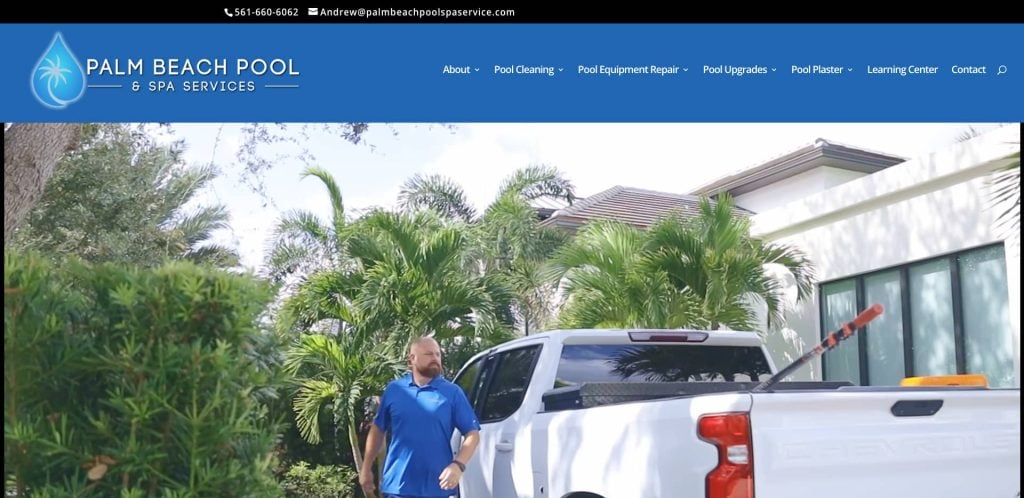
1. Palm Beach Pools and Spas
Location: Palm Beach, FL
Key Takeaways:
- Hero video background showcasing real pool installations
- Interactive 3D pool design tool for engaging visualization
- Responsive layout with clear service sections and easy gallery navigation
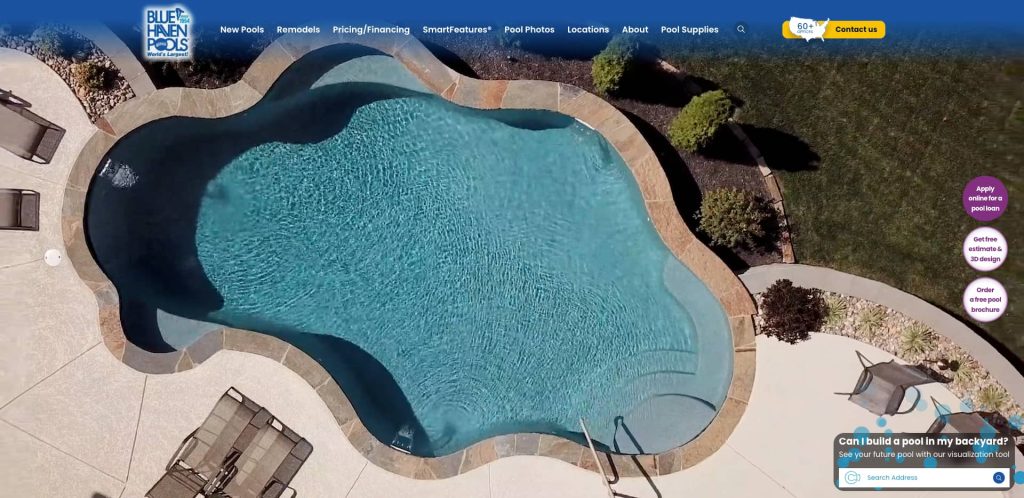
2. Blue Haven Pools
Location: Norwalk, CT
Key Takeaways:
- Rotating banner keeps site dynamic
- Virtual pool visualizer lets users experiment with pool shapes
- Dedicated blog with pool care tips builds authority
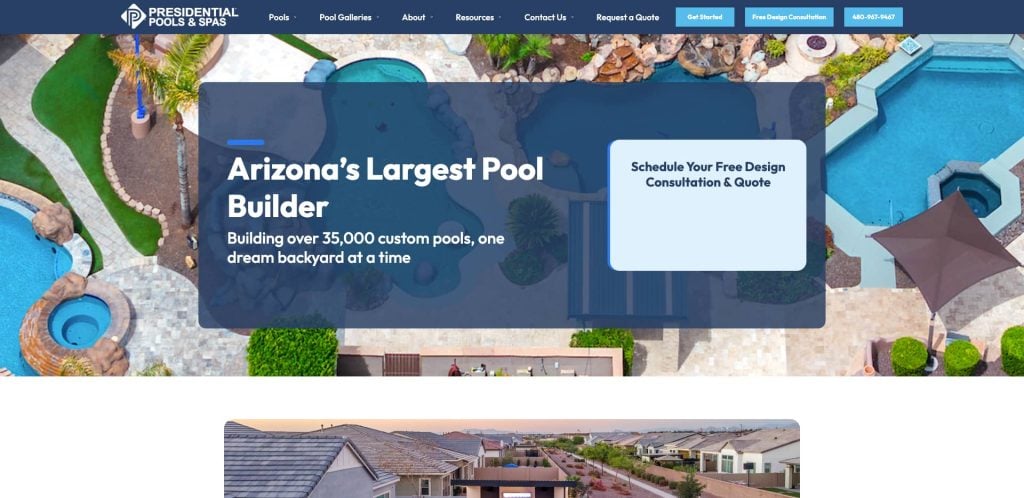
3. Presidential Pools
Location: Tampa, FL
Key Takeaways:
- Full-screen video background creates luxury feel
- Masonry portfolio with residential & commercial filters
- Virtual consultation feature adds convenience
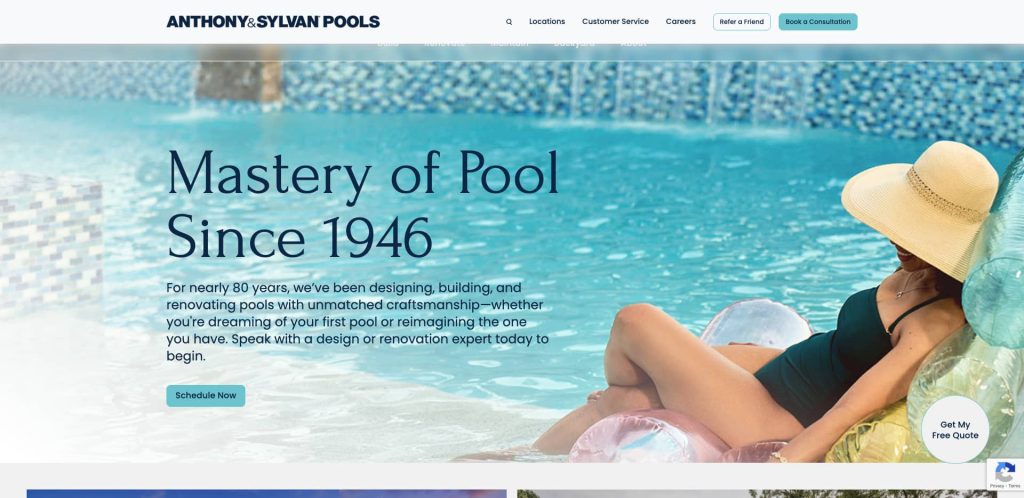
4. Anthony & Sylvan Pools
Location: Rochester, NY
Key Takeaways:
- Local business finder with prominent search function
- Extensive gallery with descriptive captions for each style
- Dedicated “Learning Center” positions expertise
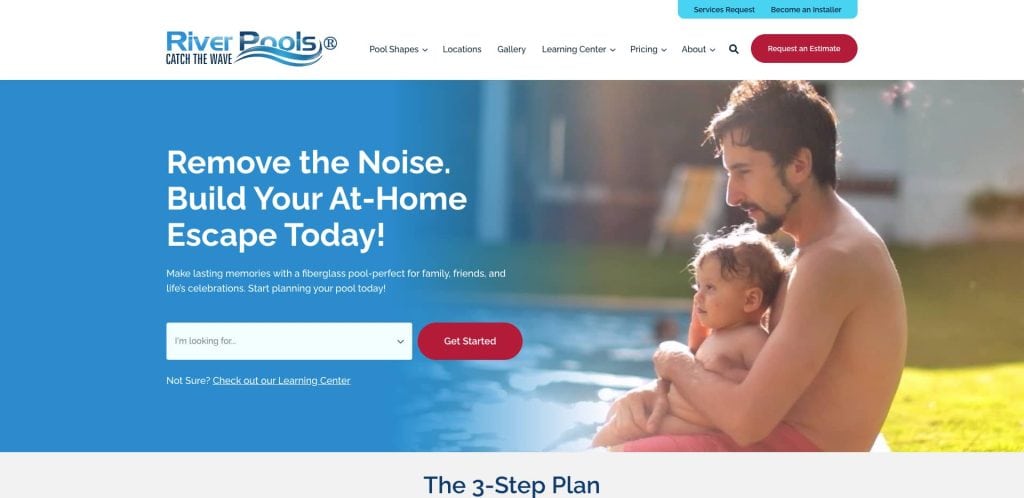
5. River Pools and Spas
Location: Williamsburg, VA
Key Takeaways:
- Interactive pool cost calculator gives instant estimates
- Extensive blog educates visitors on maintenance and trends
- Strategically placed CTAs guide visitors to contact or request quotes
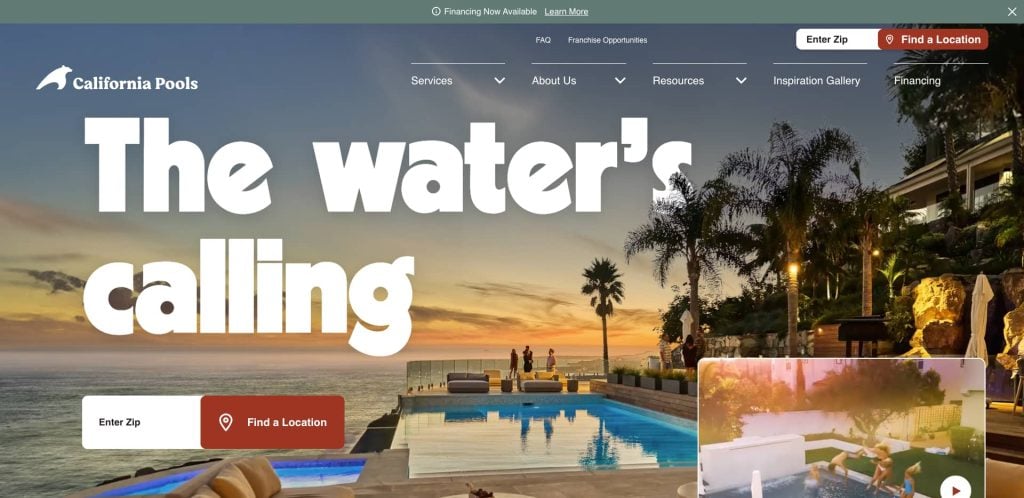
6. California Pools
Location: Irvine, CA
Key Takeaways:
- Filterable gallery allows project browsing by style or feature
- “Design Your Pool” tool enables customization before contact
- Vibrant slider images capture attention immediately
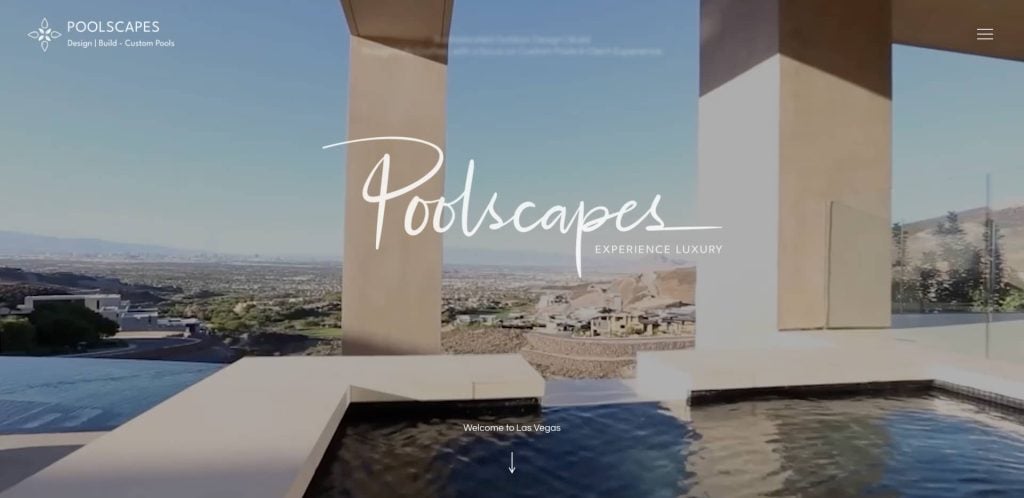
7. Poolscapes
Location: San Diego, CA
Key Takeaways:
- Full-screen homepage video highlights craftsmanship
- Virtual consultation option for remote clients
- Informative blog section enhanced with video content
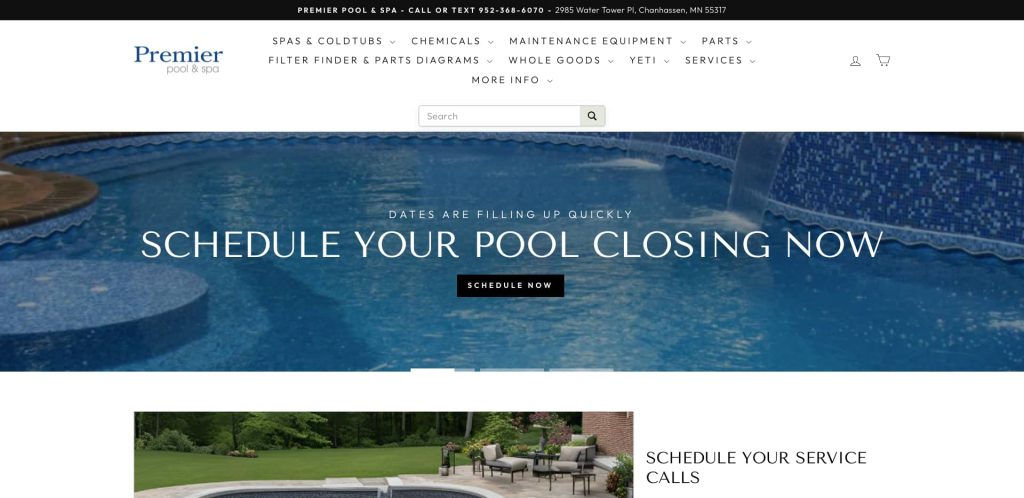
8. Premier Pools & Spas
Location: Hoover, AL
Key Takeaways:
- Pool Visualizer tool for shape and feature experimentation
- Rotating banner highlights premier project showcases
- Clear mobile-responsive quote request form
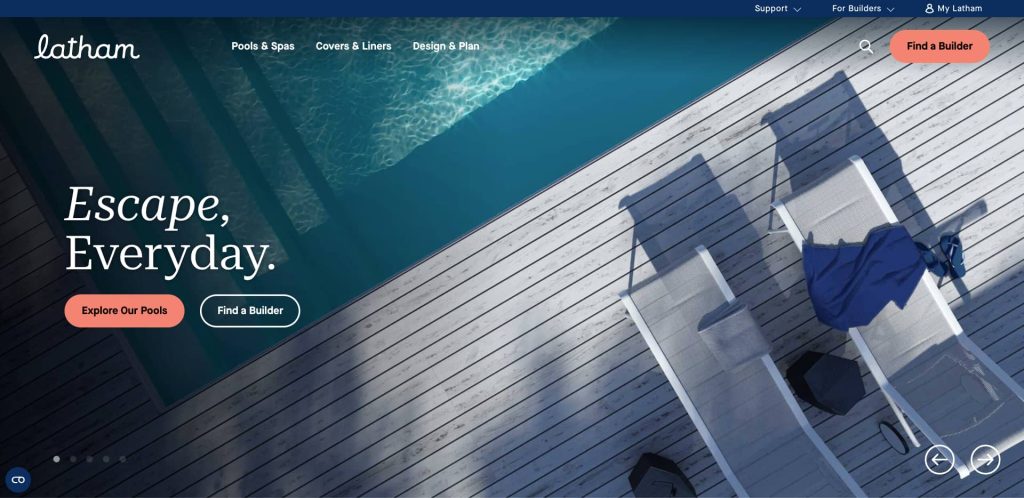
9. Latham Pool Products
Location: Norwalk, CT
Key Takeaways:
- Pool visualizer tool for DIY design engagement
- Categorized gallery of pool types and finishes
- Detailed product resources support SEO and user trust
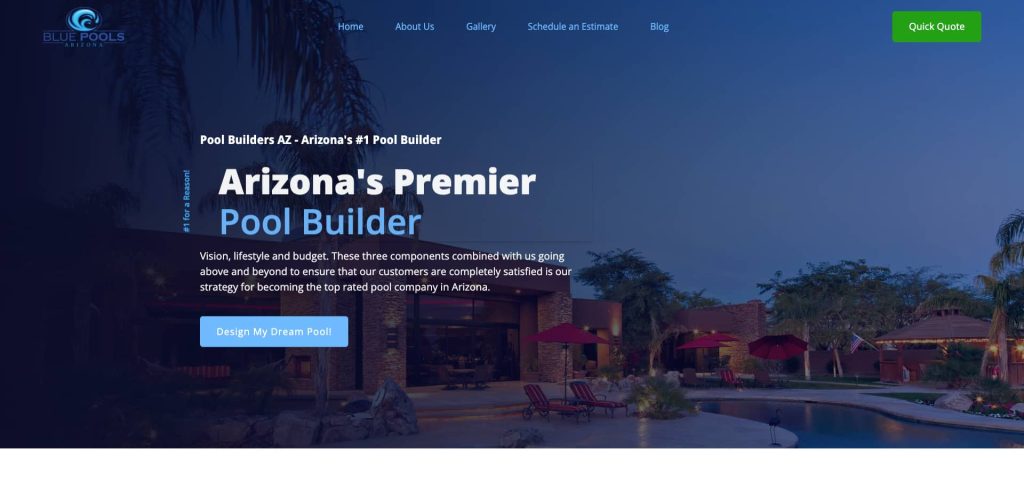
10. BD Pools and Spas
Location: Scottsdale, AZ
Key Takeaways:
- Elegant imagery with serene color palette mirrors brand identity
- Intuitive navigation leads to services and galleries effortlessly
- Strong visual hierarchy enhances conversion rates
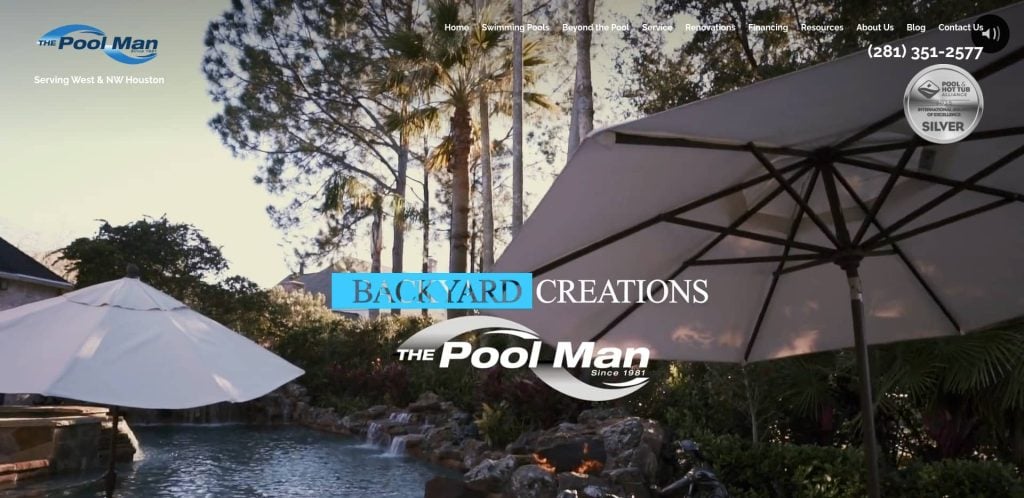
11. Poolman Inc.
Location: Tucson, AZ
Key Takeaways:
- Family-owned branding instills trust and community focus
- Comprehensive service pages covering cleaning, repair, chemicals
- Clear, conversational messaging builds rapport
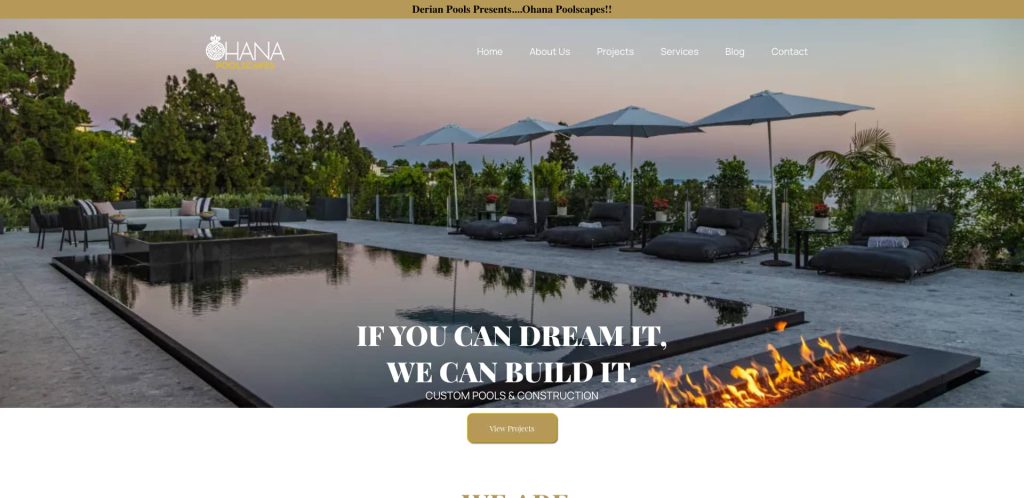
12. Ohana Poolscapes
Location: Alpharetta, GA
Key Takeaways:
- High review scores and “Best of Houzz” awards reinforce credibility
- Clean project galleries with professional photography
- Easy contact system for seamless lead capture
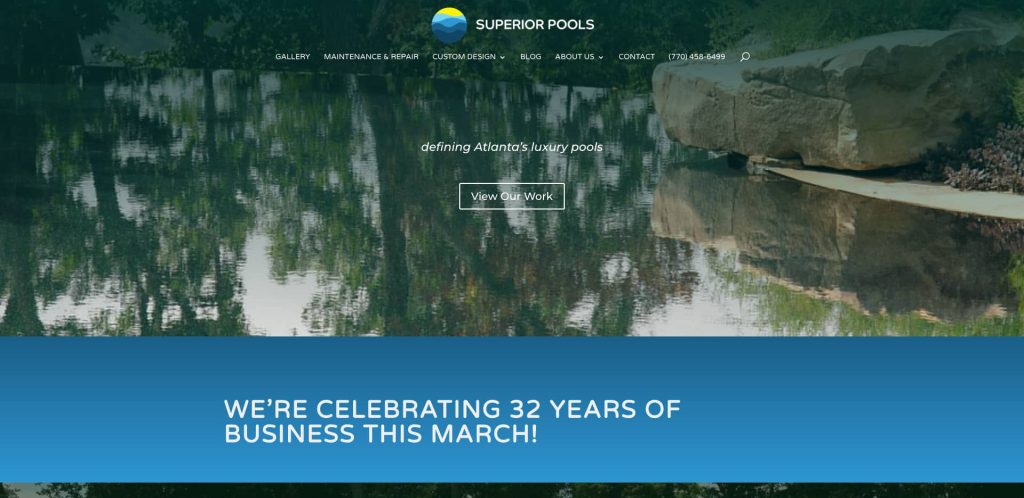
13. Superior Pools
Location: Atlanta, GA
Key Takeaways:
- Personal client testimonial builds trust: “Superior pools was great…”
- Family-focused branding appeals to local homeowners
- Informal tone helps reduce sales friction
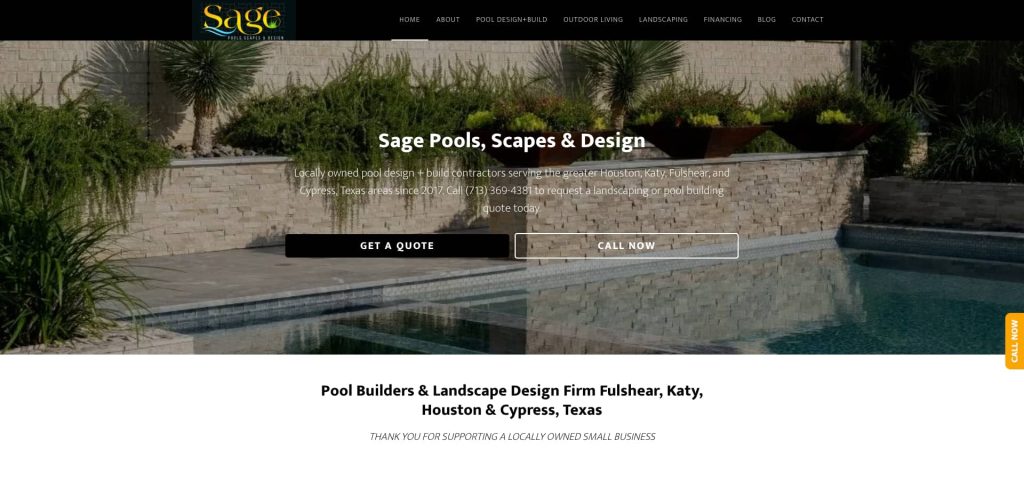
14. Sage Pools, Scapes & Design
Location: Scottsdale, AZ
Key Takeaways:
- Showcases diverse yard and landscaping expertise
- Case study quotes show transparency and results
- Focus on customization sets them apart
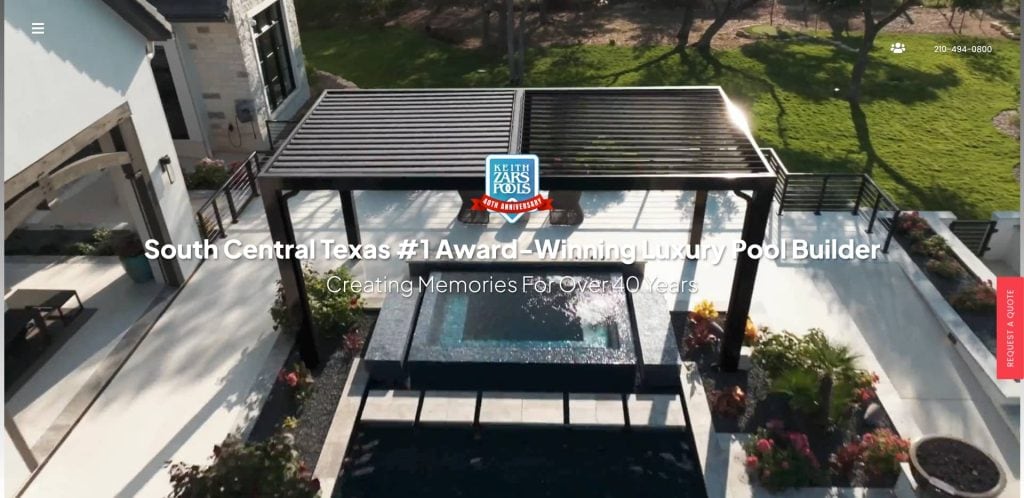
15. Keith Zars Pools
Location: San Antonio, TX
Key Takeaways:
- Showcases ultra-custom luxury designs with clear high-end branding
- Emphasizes client collaboration, sharing blueprint-and-build narrative
- Strong visual hierarchy featuring before/after photos and testimonials
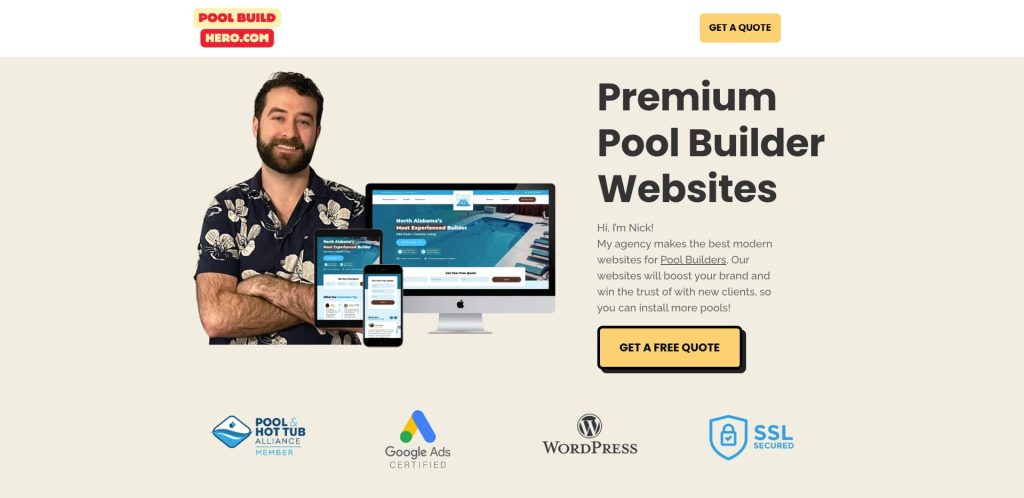
16. Pool Build Hero
Location: Remote/Denver, CO
Key Takeaways:
- Tailored marketing and web design solutions for pool businesses
- Emphasis on performance, visibility, and growth
- Calls to action focused on consultation services
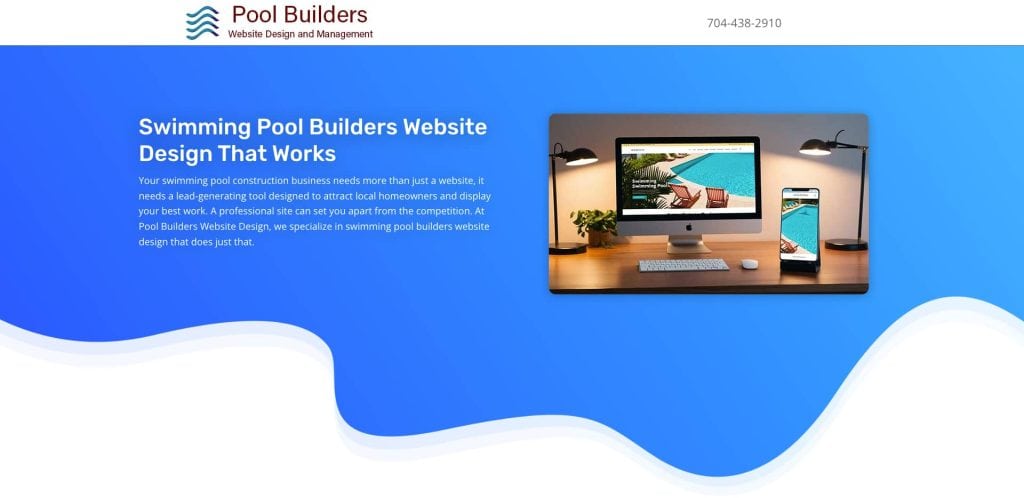
17. Swimming Pool Builders Website Design
Location: Charlotte, NC
Key Takeaways:
- Custom-crafted websites focused on mobile responsiveness for pool builders
- Lead-generation forms tailored to pool companies with integrated SEO features
- Service pages designed specifically for fiberglass, concrete, and spa installations
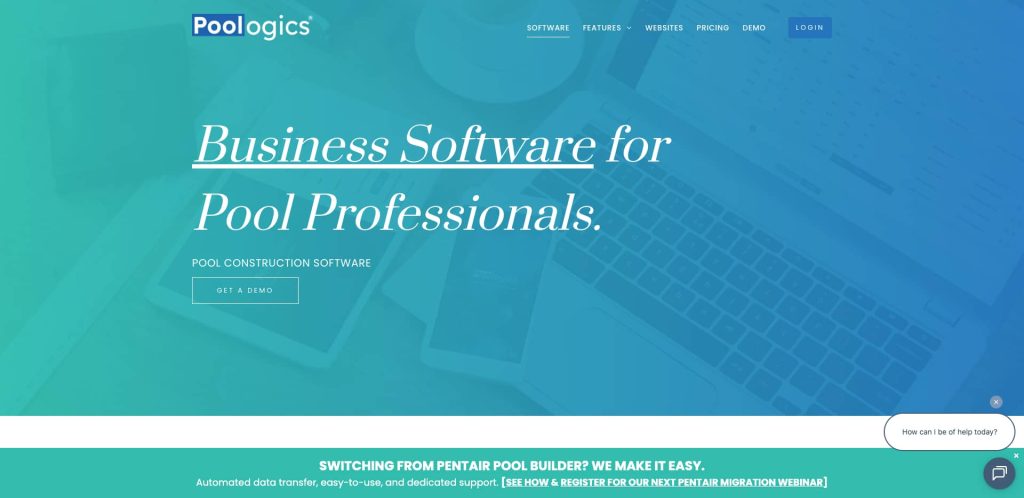
18. Poologics
Location: Remote/USA
Key Takeaways:
- Tailored website design service for pool contractors emphasizing lead generation
- Mobile responsive layouts with secure hosting and CMS integration
- SEO-friendly structure built to enhance local rankings and online visibility
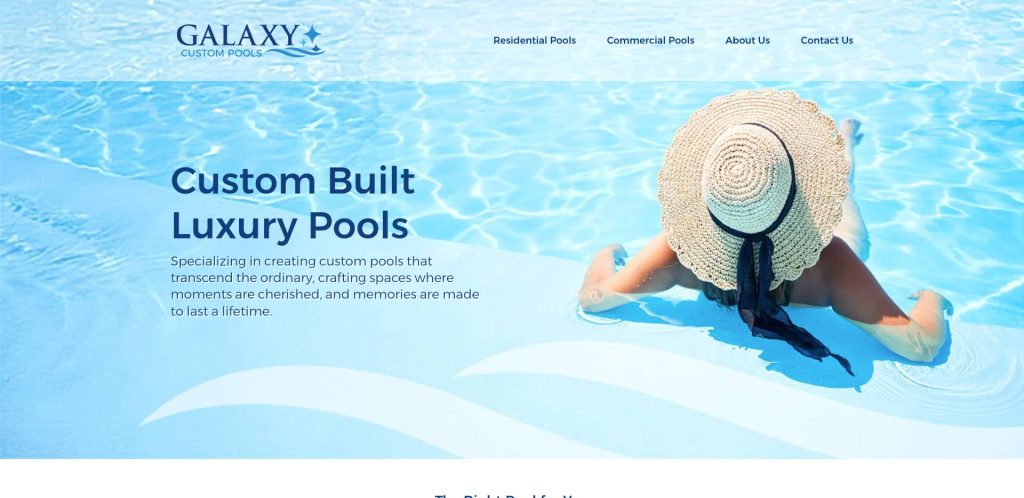
19. Galaxy Custom Pools
Location: San Antonio‑Austin, TX
Key Takeaways:
- Highlights 40+ years of experience to establish trust and credibility
- Offers both residential and commercial pool options with clear service distinctions
- Uses clean navigation and inviting calls to action for easy consultation scheduling
These websites showcase a diverse range of effective features—from interactive tools and immersive visuals to clear navigation and strong SEO foundations.
Ready to Build a Website That Works for Your Pool Business?
Whether you’re offering custom pool design, spa installations, or ongoing pool maintenance, your website should be doing more than just sitting online—it should be actively driving pool lead generation. In this industry, a poorly designed website is more than an inconvenience—it’s a liability. If your current site isn’t responsive, conversion-optimized, and built with best practices in mind, you’re likely missing out on valuable leads and losing credibility with potential clients.
A professional pool builder web design combines function with form. From showcasing your best projects to streamlining contact forms and enhancing local SEO for pool contractors, it’s about more than looks—it’s about results. Whether you’re ready to refresh an outdated website or build a website for your pool business from scratch, the right team can make all the difference.
Our full-service digital marketing agency specializes in professional pool company websites that are responsive, SEO-optimized, and designed to set you apart from the competition. Get your custom web strategy by contacting us today, and let’s create a website that builds trust with potential clients and drives your business forward.
Frequently Asked Questions About Pool Builder Site Design
What pages should a professional website include?
A well-structured site for swimming pool companies should have essential pages like Home, About, Services, Gallery, Testimonials, and Contact. Each service—such as pool design, construction, pool cleaning, or maintenance—should have its own dedicated page. This helps improve the hierarchy of your website and ensures your content is structured for both users and search engines. Including educational blog content also supports your website for ranking and builds trust and credibility with potential clients.
How important is responsive design for websites?
Responsive design is critical. Most users today will visit your site on a mobile device before ever speaking to you. A responsive layout ensures your site functions smoothly across all devices—mobile, tablet, and desktop—boosting your online visibility and reducing bounce rates. For a better understanding of mobile-first practices, explore our website organization guide.
Should I use a website builder or hire a professional?
While a website builder may offer a basic website package, swimming pool companies that want a site to truly perform should consider professional web design services. Custom websites deliver better SEO, improved speed, more flexible design for pool companies, and seamless integration with digital marketing tools. DIY platforms often lack the capabilities needed for pool builder SEO or effective marketing and advertising efforts.
What kind of visual content should pool companies include?
Your gallery should highlight a variety of pool options and completed projects, ideally with before-and-after photos. Include custom pool and spa designs, unique pool features, and your most visually stunning builds. Complement these with video walk-throughs or drone footage to elevate your professional website and increase visitor engagement.
How can pool builder SEO help my business grow?
SEO is essential for local success. Pool builder SEO helps ensure your business appears in search results when users look for services like “custom pool installation” or “pool cleaning near me.” Optimizing page titles, image alt text, meta descriptions, and using location-based keywords all contribute to your site being a website for search engines and customers alike.
What’s the best design approach for pool and spa websites?
Start with a clean, intuitive design that emphasizes your company’s strengths. Use a minimalist design to let your visuals shine while maintaining a professional layout. A well-designed website for your pool business should incorporate branding, easy navigation, fast load times, and conversion-driven CTAs. These elements combine to support your overall marketing strategies.
Can I update my website content myself?
Yes, with a proper content management system like WordPress, updating your website content is straightforward. You can add new pool project photos, blog posts, or update service details without needing a developer. This gives you control over your online marketing and ensures your website with fresh content continues to perform.
How can my site generate more leads for pool building services?
Conversion-focused design is key. Use strategically placed CTAs, forms, and trust signals like client testimonials. Your site should walk users through the design and construction process clearly while encouraging them to request a quote or consultation. Integrating your website with digital marketing efforts like PPC and local SEO will amplify lead generation.
What are common mistakes to avoid on pool company websites?
Avoid outdated designs, slow-loading pages, and cluttered navigation. These issues harm user experience and search rankings. Also, steer clear of using the same marketing company templates seen across competitors. Your site should reflect your unique services and strengths with a custom website that supports your pool building business goals.
How often should a website be updated?
Your site should be reviewed at least quarterly. Regular updates to service offerings, project galleries, blog posts, and SEO optimization ensure your site stays competitive. A website with fresh, relevant content signals to both visitors and search engines that your pool company is active, trustworthy, and the right choice for their new pool project.



